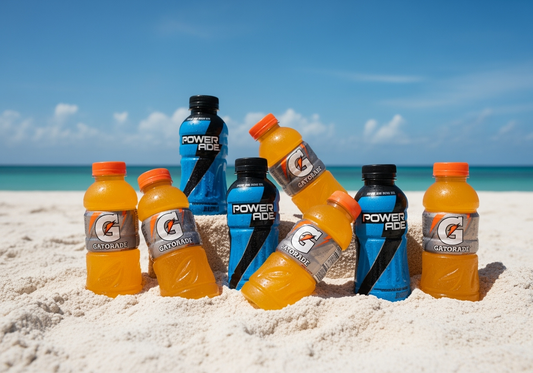Sports drinks have become a staple for athletes, gym-goers, and even casual consumers looking for a quick boost of hydration. Among the most popular are Gatorade and Powerade, two iconic brands that dominate the market. But are they really healthy? Do they cause weight gain? And how do Canadian options compare?
Let’s dive into the facts and comparisons around these beverages, answering some of the most common questions people have.
Is it okay if I drink Gatorade every day?
Drinking Gatorade every day is generally not recommended for the average person. While athletes and people engaged in prolonged physical activity may benefit from its electrolyte content and multiple flavours available on our store, the high sugar content can be problematic for those with a sedentary lifestyle.
Daily consumption may lead to unnecessary calorie intake, which can contribute to weight gain, cavities, and blood sugar spikes. If you enjoy the taste, consider the Gatorade Zero Sugar versions, though moderation is still important.
What is Coke's version of Gatorade?
When it comes to competition in the sports drink market, Gatorade is owned by PepsiCo, while Coca-Cola’s version of Gatorade is Powerade (buy from here). Launched in the late 1980s, Powerade was created specifically to compete with Gatorade, offering a similar electrolyte-replenishing formula.
Both drinks are designed to hydrate and replenish sodium, potassium, and carbohydrates lost through sweat. However, their formulations and flavours vary, which leads to an ongoing debate: which one is better?
What's healthier, Coke or Powerade?
This comparison may surprise some. While Coca-Cola is a soft drink with high sugar content, Powerade is marketed as a sports drink. However, both contain significant amounts of sugar.
· A standard 355 ml can of Coke contains about 39 grams of sugar.
· A 500 ml bottle of Powerade contains around 21 grams of sugar.
Still if you want to enjoy coke while avoiding sugar you can always opt for Zero Sugar Coca Cola once in a while. From a calorie perspective, Powerade has less sugar per serving, but it still isn’t “healthy” for everyday consumption. Ultimately, water remains the healthiest choice.
Is BioSteel made in Canada?
Yes, BioSteel is a Canadian brand that has grown in popularity as a healthier alternative to traditional sports drinks. Founded in Toronto, BioSteel markets itself as a cleaner option, free from artificial colours and added sugar.
In fact, BioSteel has gained recognition from professional athletes across North America, and it is now expanding globally. For Canadians looking for a homegrown sports drink, BioSteel stands out as an excellent option.
What is a Canadian replacement for Coca-Cola?
If you’re looking for a Canadian-made beverage that could serve as a replacement for Coca-Cola, the options usually fall into natural sodas and sparkling waters. Brands like Boylan Bottling (distributed in Canada) or Jones Soda (originating in Vancouver) have developed loyal followings.
However, when it comes to sports drinks specifically, Canadian option like BioSteel offer healthier hydration alternative without the heavy sugar load of Coke or Pepsi products.
What's the healthiest popular energy drink?
When it comes to energy drinks, most are loaded with caffeine and sugar. However, if we’re looking for the healthiest popular option, some experts recommend:
· BioSteel (sugar-free, clean hydration)
· Propel (low calorie, with added electrolytes and vitamins)
· Celsius (lower in sugar, with green tea extract for caffeine)
These options are generally considered safer than high-sugar or high-caffeine energy drinks like Red Bull or Monster.
What is the downside of Powerade?
The main downside of Powerade is its sugar and calorie content. Unless you’re engaged in heavy physical activity, you may not actually need the extra carbohydrates and electrolytes it provides.
Other concerns include:
· Artificial colours and flavours
· Potential for weight gain if consumed regularly
· Not suitable for people with diabetes or those monitoring sugar intake
While it can be helpful for athletes, most people can hydrate effectively with water.
What is the Canadian version of Gatorade?
The closest Canadian version of Gatorade is BioSteel. Unlike Gatorade, BioSteel focuses on clean ingredients, often featuring zero sugar, plant-based sweeteners, and added vitamins.
While Gatorade has the advantage of being widely available, BioSteel appeals to health-conscious consumers who want the hydration benefits without the artificial additives.
Is vitamin water or Gatorade better?
This depends on your needs.
· Vitamin Water: Provides added vitamins but often contains sugar or artificial sweeteners. It’s marketed more as a “lifestyle” drink than a performance beverage.
· Gatorade: Specifically designed for sports performance with electrolytes and carbohydrates to aid recovery.
If you’re working out intensely, Gatorade may be better. If you’re just looking for a vitamin boost with some flavour, Vitamin Water may be the lighter choice.
Is zero sugar Gatorade good for you?
Zero sugar Gatorade (also known as Gatorade Zero) eliminates the high sugar content of traditional Gatorade by using artificial sweeteners. While it avoids extra calories and may be better for those watching their weight, it isn’t entirely without drawbacks.
Some people are sensitive to artificial sweeteners, and while it hydrates, it doesn’t provide the same energy boost that comes from carbohydrates. Overall, it’s a better option for casual drinkers than the original Gatorade.
Does Gatorade cause weight gain?
Yes, Gatorade can cause weight gain if consumed regularly without matching the calorie burn from exercise. A standard bottle contains around 140 calories and 34 grams of sugar. Over time, this can add up, especially for people who aren’t physically active.
Athletes may use those calories for performance and recovery, but for the average person, regular Gatorade consumption may lead to excess calorie intake and weight gain.
Is Propel better than Gatorade?
Propel is another sports drink owned by PepsiCo, designed to be a lighter alternative to Gatorade. Propel has fewer calories, is sugar-free, and includes added vitamins.
Compared to Gatorade, Propel is better for everyday hydration because it doesn’t carry the same risk of sugar-related weight gain. However, Gatorade still holds an advantage for endurance athletes who need quick carbohydrate replenishment.


